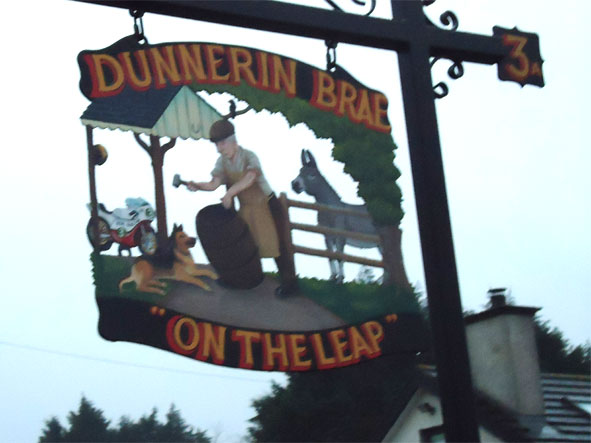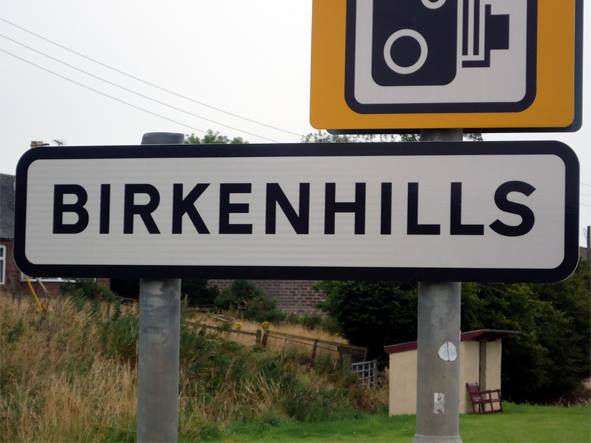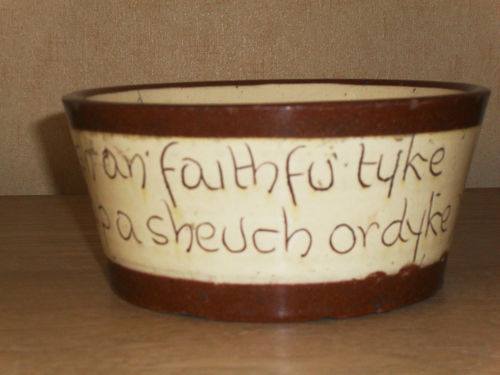Wir Ain Leed — Adjectives
Adjectives are words added to nouns to qualify them or to limit their denotation by reference to quality, number or position.
 Bridge of Craigisla, Angus
Bridge of Craigisla, AngusAdjectives are usually formed from nouns and verbs by adding <-ie> or where words are shared with or similar to Standard English <-y> may be used.
The internal inconsistency caused by unpredictably using <-ie> or<-y> will be found on this site. Some writers simply use one or the other.
A greasy cloth.
A stony road.
The ragged clothes.
The dusty mantlepiece.
The grasping monkey.
 Armoy, County Antrim
Armoy, County AntrimThe present participles of verbs (-in) may also be used as adjectives.
The rumbling bridge.
A stunning blow.
Those clothes are full of lice etc.
A (very) small pair of boots.
 Dunblane, Stirling
Dunblane, StirlingThe past participles of verbs may also be used as adjectives. The forms end in in (e)n being the most common.
The threshed grain.
The scared boy.
The drunk man.
The cast ball.
The shod horse.
The obstinate woman.
The soaked dog.
The swept floor.
Suffixes and prefixes
 Turriff , Aberdeenshire
Turriff , AberdeenshireAdjectives may also be formed by adding the suffixes <-n> and <-en> or <-ern> to nouns.
The stone wall.
The wooden boards.
A straw scarecrow.
A woollen dishcloth.
The suffix <lin> or <lins> signifies 'direction', 'manner', 'condition' or 'degree'.
It is a fierce east wind.
The half-grown boy.
He was blind drunk last night.
The fresh north wind blew without respite.
The fishwives were selling west-coast herring.
 Scots inscribed dog bowl
Scots inscribed dog bowlThe suffix <fu> implies the subjective condition.
A timid little dog.
The honest fellow.
The melancholy widow.
Awfully dreary weather.
The thoughtful headmaster.
An awful mishap.
The suffix <some> also implies the subjective condition.
A ghastly old woman.
A beautiful joyous day.
A charming young man.
A sad going occurance.
The suffix <rif(e)> signifies 'full of the quality of'.
The baby is awfully wakeful.
It's an extremely cold day today.
Adjectives may be formed by suffixing <like> can be attached to adjectives to qualify the meaning.
The night was blackish.
Such people make me shudder.
She presented a good appearance, being so well dressed.
The old sycamore tree had a shrunken appearance.
Both kind or kin can also be used after adjectives to qualify the meaning.
With all the work, it was going to be a longish day.
There was no moon th be seen; it was a blackish night.
The prefix <cam> signifies 'awry'.
The ill-natured old fool wouldn't let me see his daughter.
The rope was so tangled that I couldn't untangle it.
A crooked walking-stick.
Those are extremely unruly cattle.
Siccan (sic kin). With the indefinite article added siccan becomes sicna.
Such a kind of day as I have had, so cold as it is.
Singular and Plural
 Elgin, Moray
Elgin, MorayAdjectives don't usually change their form in the plural, the following exceptions exist:
In Mid Northern and North Northern Scots this and that are used as plurals rather than thir and thae.
Demonstrative adjectives
Definite demonstrative adjectives refer to a particular person or object.
This and thir refer to objects near the person speaking.
That and thae refer to objects near the person spoken to.
Yon (thon) refers to objects farther off in place or time.
Northern Scots uses this and that as the plural rather than thir and thae.
I don't like those potatoes.
Whose are these children?
Do you see that tree over there?
I often think of that time (long ago).
That man is a absolute blockhead.
I haven't seen him for a long time.
She hadn't seen him for many years.
Indefinite demonstrative adjectives do not refer to any particular person or object.
Is any porridge left?
He didn't have any others.
She bought another bag of apples.
I would rather have the other
The fellows inquired what each other had.
He’s been among the nieces and Christina’s other relations.
Adjective comparisons
In single syllable words comparisons are formed by suffixing er (comparative) and est (superlative).
The comparative expresses more or greater degree The superlative expresses the greatest or highest degree.
An alternative to near is naur, nauerer or naur(d)er and naur(d)est.
If the adjective ends with ee the comparative and superlative are formed by adding -er and -est respectively e.g. wee (small), wee-er, wee-est.
Note the comparative of like - liker meaning more like.
In words of two or more syllables the comparative is formed by prefixing mair, and the superlative is formed by suffixing maist.
The tree is larger than the house.
The house is the largest building in town.
Sometimes double comparatives and superlatives are used.
He's older than me.
It's sweeter than honey.
The prettiest girl.
Irregular comparison.
Mony, mair and maist are used with countable nouns.
Muckle, mair and maist are used with uncountable nouns.
The nouns of number, quantity and distribution are often used as adjectives, others are:
It is infrequent that the sun shines for so long.
There are only a few people who have come.
Every now and then there is an occasional blast of wind.
That is an odd fellow.
 Finzean, Aberdeenshire
Finzean, AberdeenshireSeveral nouns, adverbs and prepositions of place are used as adjectives.
first
*ben is only used to refer to the inner room of a dwelling.
**In colloquial speech in is often shortened to i' in unstressed positions before consonants and is sometimes written as such.
Interrogative adjectives
Interrogatives ask questions.
The older whilk corresponding to Standard English 'which' is now obsolete in speech but may occur in literature. Whilk may be replaced by whit.
Whit cou's that?
Which cow is that?
Whit haund will ye tak?
Which hand will you take?
Whitten (whit kin o) is used both singularly and in the plural and can mean, depending on situation or context, 'what kind of?' or 'what sort of?'
With the indefinite article added whitten becomes whitna.
Which (part of the) country do you come from?
In which year were they married?
What kind of tabacco is that?
What kind of people do such like?
What kind of a person is he (or she)?
What kind of a cow is it that you have?
Negative Adjectives
<Wan> is a negative prefix roughly corresponding to 'un'.
That was a singularly unfortunate accident.
Yonder elder tree is awfully deformed.
The lost belongings were unclaimed.
Your daughter is a mischievous little girl.
Negative adjectives nae and nane.
The negative adjective nae is used before nouns.
I have no money in my pocket.
It's no good crying.
No doubt you’ll wear your flannel smock.
None of them.
None of the two.
Neither of you shall go.
Negative attributes can be expressed by adding less to the noun or verb.
The careless little boy.
The faint-hearted soldier.
A harmless little lamb.
A thoughtless thing to do.
